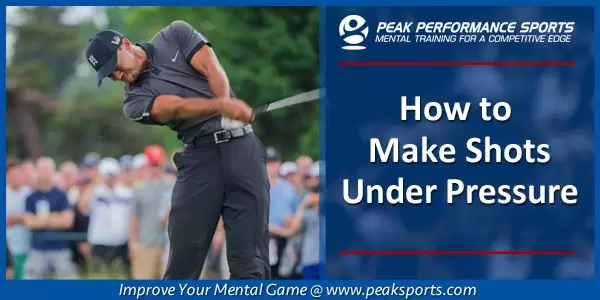
Pressure In Golf
Every golfer desires to have “nerves of steel” when facing critical shots. But many golfers implode when faced with big shots.
Questioning your ability to make shots and focusing on others’ play makes your focus on the wrong objective in golf. Trying to be perfect causes golfers to choke at the most inopportune time…
If you want to develop “nerves of steel” emulate the approach of clutch PGA players.
Jason Dufner won his fourth PGA Tour title at the 2016 CareerBuilder Challenge while making critical shots on the last few holes including sinking the winning putt in a pressure-packed sudden-death playoff against David Lingmerth.
Dufner’s ability to maintain his composure proved to be a huge advantage during the final round of the tournament.
Dufner made a miraculous par save on his second shot from the rocks on the par-3 17th hole to stay in contention for the victory. Dufner made that shot when he needed it most, “It was probably like a one in like 50 million that that ball ends up there [right near the cup].”
When asked about that huge par save shot, Dufner provided some useful insight on the best mindset to handle pressure.
DUFNER: “I think it’s just the hard work I put in. I like those situation putts. It’s kind of like what we see in the Presidents Cup in match play. Because if I miss it, there’s no next putt, it doesn’t really matter. So I got real aggressive with my read, got real aggressive with my stroke, and I committed to it.”
DUFNER: “I’m committed to the routine that I have before I hit putts, so it felt good to know that some of that work that I’ve been doing paid off in that type of situation. But I like those situations when there’s no, that’s the end game right there. You either make it or you miss it. There’s no, nothing else. So I usually do pretty good in those situations.”
We can see six critical elements to Dufner’s ability to make “big” shots:
- Preparation – You have to “put in the hard work.” Practice the same way you want to play. Create pressure situations and rehearse how you will respond to those shots under pressure.
- Go for it – You need to be aggressive and play to win. Get your mind off the negative things that could potentially happen and stay focused on the process or what you need to do to play the best shot right now.
- Commit to shot – You need to choose a strategy and stick with it. Be decisive and act rather than overthink and play hesitantly.
- Pre-shot routine – You should have a consistent pre-shot routine that you perform prior to every shot. By settling into your pre-shot routine, you transition your focus from your “thinking” mind (focus on strategy) to total immersion in the process (the action of putting).
- Trust – You should have trust in your swing… especially because you have put in the work.
- Enjoy the challenge – The reason you golf is for the challenges it presents to you. Enjoy it! You will perform a lot better if you approach the shot with excitement instead of fear and apprehension.
If you commit to putting in the mental work, you can improve your performance under pressure.
Tip for making great shots under pressure:
Develop, practice, commit, and perform a consistent pre-shot routine.
Your routine should include all aspects from the moment you approach the ball: from how grip your club, body alignment, taking your stance, waggles, eyeing target, cue words, deep breaths, and any other personal preferences.
The key is consistency in both practice and tournaments.
Your routine will help quiet your mind and immerse you in the action you are about to take.
Golfer’s Mental Edge

What’s the big sign that your mental game is the weak link in your golf game? When you can’t play consistently as well as when you play a practice or casual round–or your range game is way better than your game on the course. If you suffer from lack of focus, low self-confidence, poor composure or other mental game obstacles on the course, you can’t reach your true potential in golf.
The Golfer’s Mental Edge 2.0 Audio and Workbook program is ideal for any amateur, collegiate, junior, and tour professional golfer.
Golf coaches and instructors would also be wise to teach “The Golfer’s Mental Edge 2.0” principles to their players. This program is perfect for any golfer who wants to improve performance and consistency by managing their mind better on the course.
